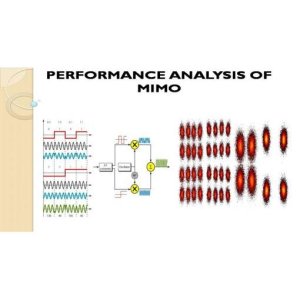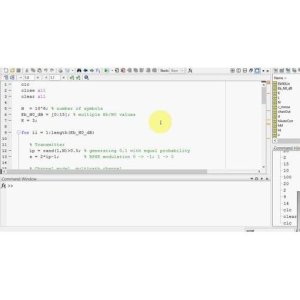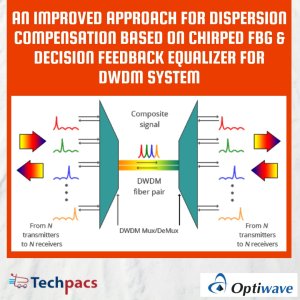MMSE Equalization Technique for MIMO-OFDM Systems Performance Analysis
Problem Definition
PROBLEM DESCRIPTION:
In wireless communication systems, achieving reliable and secure transmission of data is a prime concern. One of the key challenges faced by designers is the interference caused by inter symbol interference (ISI) which can significantly impact the performance of the system, leading to a higher Bit Error Rate (BER) and reduced Quality of Service (QoS). In order to address this challenge, various equalization techniques have been developed, such as Maximum Ratio Combining (MRC) and zero-forcing equalization.
This project focuses on analyzing the performance of the Minimum Mean Square Error (MMSE) equalization technique when applied in Multiple Input Multiple Output (MIMO) - Orthogonal Frequency Division Multiplexing (OFDM) systems. The MMSE algorithm is employed to mitigate the effect of ISI on the transmitted signal and improve the system's BER.
By evaluating the efficiency of the MMSE equalization technique through calculations of QoS parameters like BER and Peak-to-Average Power Ratio (PAPR), the project aims to assess the impact of this technique on the overall performance of the MIMO-OFDM system.
Therefore, the problem statement revolves around determining the effectiveness of the MMSE equalization technique in reducing ISI and improving the BER of the MIMO-OFDM system. Through the implementation of this project using MATLAB software, the goal is to optimize the performance and reliability of wireless communication systems, ultimately enhancing the data transmission quality and security.
Proposed Work
This research project titled "Performance analysis of MMSE equalization technique for MIMO systems in wireless communication" focuses on evaluating the efficiency of the Minimum Mean Square Error (MMSE) equalization technique when applied in MIMO-OFDM systems. The project falls under the category of Wireless Research Based Projects, specifically in the subcategory of Channel Equalization in the field of Digital Signal Processing. By analyzing the Quality of Service (QoS) parameters such as Bit Error Rate (BER) and Peak-to-Average Power Ratio (PAPR), the performance of the MMSE equalization technique is assessed. The project aims to improve the reliability and security of data transmission in wireless systems by reducing Inter Symbol Interference (ISI) and BER. The MATLAB software is used for the implementation, calculation, and verification of results, with modules such as Multiuser Detection, Signal Processing, OFDM, and Wireless Networks being crucial for the project.
The project not only contributes to the understanding of MMSE equalization technique but also provides insights into the overall performance of MIMO systems in wireless communication.
Application Area for Industry
The project focusing on the analysis of the MMSE equalization technique in MIMO-OFDM systems can be applied in various industrial sectors such as telecommunications, aerospace, defense, and healthcare. In the telecommunications sector, where reliable and secure data transmission is essential, implementing this project's proposed solutions can help in optimizing wireless communication systems, reducing interference, improving BER, and enhancing QoS parameters. In the aerospace and defense sectors, the project can be utilized to enhance the performance of communication systems in unmanned aerial vehicles (UAVs), radar systems, and satellite communication. In the healthcare industry, where wireless communication plays a crucial role in medical devices and telemedicine applications, the project's solutions can ensure reliable and secure data transmission, improving patient care and monitoring.
Specific challenges that industries face related to wireless communication, such as interference, ISI, and BER issues, can be effectively addressed through the implementation of the MMSE equalization technique.
By assessing the impact of this technique on QoS parameters and performance metrics, industries can optimize their communication systems for higher reliability and security. The benefits of implementing these solutions include improved data transmission quality, enhanced system performance, and increased efficiency in handling wireless communication in challenging environments. Overall, the project's focus on analyzing the MMSE equalization technique in MIMO-OFDM systems can have significant implications for various industrial domains, leading to enhanced communication capabilities and streamlined operations.
Application Area for Academics
The proposed project on the performance analysis of the Minimum Mean Square Error (MMSE) equalization technique for Multiple Input Multiple Output (MIMO) systems in wireless communication holds significant relevance for MTech and PhD students conducting research in the field of digital signal processing. By focusing on evaluating the efficiency of the MMSE equalization technique in MIMO-Orthogonal Frequency Division Multiplexing (OFDM) systems, this project offers a valuable opportunity for innovative research methods and simulations. MTech and PhD scholars can utilize this project to explore advanced equalization techniques, analyze QoS parameters such as Bit Error Rate (BER) and Peak-to-Average Power Ratio (PAPR), and enhance the reliability and security of data transmission in wireless systems.
Moreover, students can leverage the MATLAB software implementation of this project to conduct in-depth data analysis, simulation, and optimization techniques for their dissertation, thesis, or research papers. The project provides a rich source of code and literature that can be used to explore the performance of MMSE equalization technique, understand the impact on ISI reduction and BER improvement, and contribute to the advancement of MIMO systems in wireless communication.
Researchers specializing in channel equalization, wireless networks, and adaptive equalization can benefit from the insights and findings generated by this project.
In conclusion, the proposed project offers MTech and PhD students a valuable opportunity to delve into cutting-edge research in wireless communication systems, explore the applications of advanced equalization techniques, and contribute to the optimization of data transmission quality and security. The future scope of this project includes exploring variations of the MMSE equalization technique, incorporating machine learning algorithms for further optimization, and investigating the impact on different QoS parameters in MIMO-OFDM systems. By incorporating this project into their research endeavors, students can pave the way for innovative advancements in the field of digital signal processing and wireless communication.
Keywords
Wireless communication, Reliable transmission, Secure data, Inter symbol interference, ISI, Bit Error Rate, BER, Quality of Service, QoS, Equalization techniques, Maximum Ratio Combining, MRC, Zero-forcing equalization, Minimum Mean Square Error, MMSE, Multiple Input Multiple Output, MIMO, Orthogonal Frequency Division Multiplexing, OFDM, Peak-to-Average Power Ratio, PAPR, MATLAB software, Wireless system performance, Data transmission quality, Channel equalization, Digital Signal Processing, Multiuser Detection, Signal Processing, Wireless Networks, CDMA, Linpack, Localization, Networking, Routing, Energy Efficient, WSN, Manet, Wimax, LMS, NLMS, MUD, Multiplexing, Decorelating, Matched, Latest Projects, New Projects, DSP, Digital Filter, Analog Filter.
| Shipping Cost |
|
No reviews found!


























































No comments found for this product. Be the first to comment!